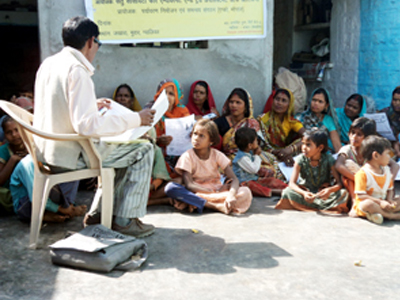Home / All Socio-economic Activities / Save the Water & Save the Trees / Forests
A campaign on “Save the water & Save the trees” was organised at ‘Jakhara, Morar’ a local area in the city on Feb 28, 2012.

It has been known that contaminated water is the leading worldwide cause of deaths and diseases, and that it accounts for the deaths of more than 14,000 people daily. An estimated 700 million Indians have no access to a proper toilet, and 1,000 Indian children die of diarrheal sickness every day. With this distressing fact in mind SETU with help of (EPCO) the Environmental Planning & Coordination Organization organized a “Save the water & Save the trees” campaign at ‘Jakhara, Morar’ a local area in Gwalior.
The campaign was set up with an objective of enlightening the local population about the importance of water in not only an individual’s life but also of its existence on the planet earth. Another significant point of discussion at the campaign was saving the trees & forests.
There were approx. 53 attendees, comprising mostly women and children. The awareness level of the village on environment sustainability was low, due to lack of education & exposure. The surroundings of their water sources i.e. the hand pumps & wells were found contaminated and unhygienic, hence the area was chosen to demonstrate the ways of saving & cleaning natural resources & focus on the importance of this important issue.
The discussion was continued by quoting-
“A drop of water is worth more than a sack of gold to a thirsty man”
&
“Plant a tree & get air for free”
Our speakers enlightened the crowd on various key points; some of the key pointers are elaborated as under:
At the conclusion of the session, an interactive discussion with the crowd was conducted, and some more useful tips were explained to them. SETU distributed chlorine tablets and solution that helps in cleaning the water and for the children present at the campaign sweets were distributed to acknowledge their presence. The completion of the seminar was done by cleaning the nearby hand pump area, which is also the water source for local residents of the area. The reaction from the crowd seemed to be positive and acceptable; they did come up with some doubts, which our speakers were able to clarify. They also contributed with more ideas of their own to address the issue.